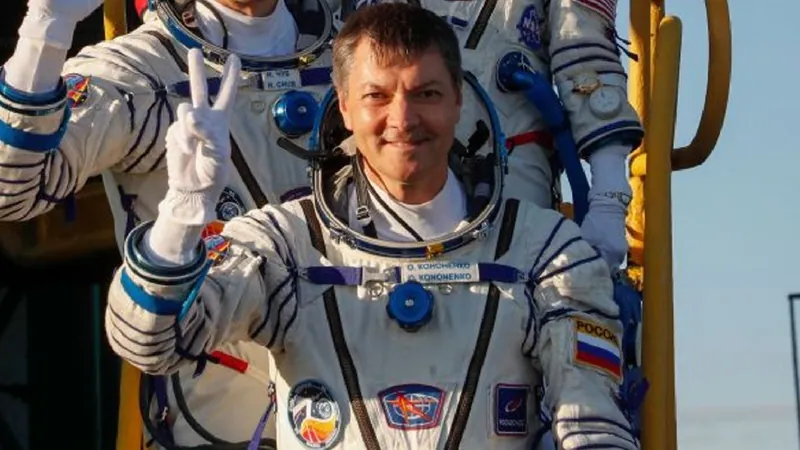
Record-Breaking Return: Russian Cosmonaut Oleg Kononenko's Epic 1,111 Days in Space
2024-09-26
In a remarkable achievement that has solidified his name in the annals of space exploration, veteran Russian cosmonaut Oleg Kononenko has returned to Earth after an astounding record-breaking 1,111 days spent in orbit. The 60-year-old space pioneer landed safely on September 23 aboard Russia's Soyuz MS-25 spacecraft, alongside fellow cosmonaut Nikolai Chub and NASA astronaut Tracy Caldwell Dyson. Their capsule touched down in the vast steppes of Kazakhstan just 3.5 hours after undocking from the International Space Station (ISS).
Kononenko's journey isn't just a tale of endurance; it marks a significant milestone in human space exploration. Over his illustrious career, he has completed a staggering 374 continuous days aboard the ISS, narrowly surpassing the previous record held by American astronaut Frank Rubio, who spent 371 days in orbit due to an unforeseen spacecraft issue last year. Meanwhile, Dyson completed a noteworthy 184-day mission, showcasing the varied experiences of astronauts aboard the ISS.
This visionary cosmonaut first set the record for the most cumulative days in space back in February 2023, overtaking the previous record of 878 days held by his fellow countryman Gennady Padalka since 2015. Kononenko’s remarkable tally comes from five separate missions to the ISS since his first flight in 2008, demonstrating the significance of consistent contributions to science and exploration.
As he prepared to leave the ISS, Kononenko expressed heartfelt gratitude to his crewmates, remarking, "Thanks to all my crewmates for your friendship. It has been a great time and pleasure to work and spend time together here as a big family on board the International Space Station. Right now, I am leaving my second home." This sentiment resonates deeply with many who have ventured into the cosmos, highlighting the camaraderie developed among astronauts.
Throughout his time in space, Kononenko has not only spent nearly 44 hours on seven different spacewalks but has also completed approximately 17,800 orbits around our planet. To put his extraordinary contribution into perspective, Kononenko represents about 1.5% of the total time spent in space by more than 600 individuals since Yuri Gagarin made history as the first human in space in 1961.
While Kononenko has broken numerous records, he has yet to eclipse Valeri Polyakov's long-standing record for the longest single continuous stay in space, which remains at 437 days aboard the Mir space station during the mid-1990s.
During this latest mission, 14 different spacecraft docked with the ISS, including Boeing's Starliner rocket, which encountered multiple technical glitches but managed a successful uncrewed mission. Notably, NASA astronauts Butch Wilmore and Suni Williams have recently faced delays, causing Williams to assume command of the ISS from Kononenko.
As the world eagerly anticipates his next potential ventures, it remains uncertain if Kononenko will embark on future space missions. While he hasn't formally announced his retirement, he has candidly acknowledged that the complexities of space travel appear to be escalating.
Even with his storied career, Kononenko expressed that setting records was never his primary motivation, opining, "I fly into space to do my favorite thing, not to set records." With the ongoing evolution of space exploration strategies globally, Russian cosmonauts are expected to engage with the newly completed Tiangong space station, fueled by ambitions for lunar base construction by 2035.
As we look towards the future, Kononenko's record may remain unchallenged for years, with the next active astronaut on the list, Sergey Prokopyev, currently sitting at 567 cumulative days in space, unlikely to surpass this illustrious milestone before significant changes in international space dynamics unfold.
As we celebrate this historical journey, it serves as a thrilling reminder of the unyielding human spirit and the relentless pursuit of knowledge that drives our exploration of the final frontier.









 Brasil (PT)
Brasil (PT)
 Canada (EN)
Canada (EN)
 Chile (ES)
Chile (ES)
 España (ES)
España (ES)
 France (FR)
France (FR)
 Hong Kong (EN)
Hong Kong (EN)
 Italia (IT)
Italia (IT)
 日本 (JA)
日本 (JA)
 Magyarország (HU)
Magyarország (HU)
 Norge (NO)
Norge (NO)
 Polska (PL)
Polska (PL)
 Schweiz (DE)
Schweiz (DE)
 Singapore (EN)
Singapore (EN)
 Sverige (SV)
Sverige (SV)
 Suomi (FI)
Suomi (FI)
 Türkiye (TR)
Türkiye (TR)